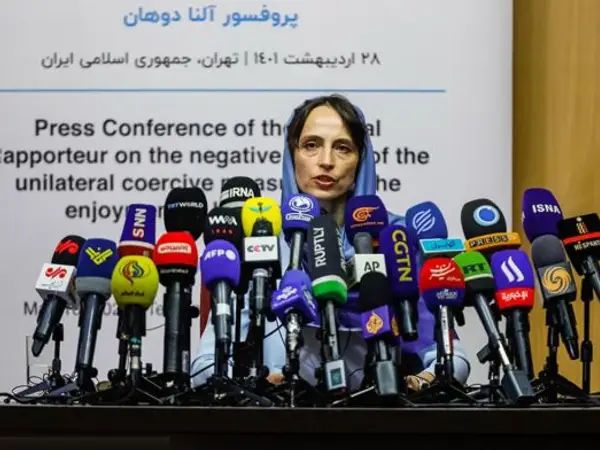A UN Special Rapporteur has come under fire for receiving donations from repressive regimes, but she says the media accusing her are in violation of ethics.
Last week, Alena Dohan concluded a controversial 11-day visit to Iran in which she rejected appeals by Iranian human rights activists to meet dissidents and did not speak about the crackdown on the ongoing protests. She is the UN Human Rights Council’s Special Rapporteur on the negative impact of unilate7ral coercive measures on the well-being of the people.
To shed further light on the controversy, Iran International sent written questions to her office and received a written response, in which the special rapporteur defended her actions and lack of actions, threatening the media by using language such as “serious violation of ethics may have been committed by some news outlets…ending up in defamation and libelling.”
Criticism of Douhan’s mission has been spearheaded by United Nations Watch (UNW), a Geneva-based UN watchdog. Hillel Neuer, executive director of UNW, has argued that Douhan is a lobbyist for repressive regimes such as China, Russia and Qatar from which she took hundreds of thousands including $200,000 from China for the UN human rights expenses,
“Alena Douhan of Belarus is only able to exploit her UN human rights post to shield brutal regimes—Venezuela’s Maduro, Xi Jinping’s China, and, last week, Khamenei’s Iran—because of her enablers in the international human rights community,” Neuer tweeted Sunday.
In the response to Iran International, Douhan’s office wrote that receiving donations from government’s is “standard practice for the UN” and other countries such as South Korea, Japan and Norway and Russia have also donated to her office. But the issue is that she appeared at a virtual event along Chinese officials who covered up human rights violations committed against millions of Uyghurs.
Douhan has said that reduced revenues from the export of goods, low salaries and the deteriorating economic situation, and inflation have “reduced the capability of the [Iranian] government to maintain the level of social support it used to exercise in the spheres of food, health and housing”. Critics say this is a one-sided judgement as it only blames the sanctions and fails to consider the government’s own inefficiency and wrong policies.
Iranian officials have welcomed Douhan’s assertion that US sanctions have hugely deprived Iranian people of their human rights while stressing that that her mission was solely to investigate the impact of sanctions. The role of this rapporteur was created at the UN Human Rights Council by the adoption of a resolution proposed by Iran on behalf of Non-Aligned Movement in 2014.
Amir-Ali Abolfath, an international affairs expert, told the semi-official Iranian Students News Agency (ISNA) Sunday that Douhan’s visit as a UN representative and her report which will be presented at the next meeting of the UN Human Rights Council in September were important because Iran could use the evidence gathered by her in the future at international courts of law against the United States.
London-based human rights lawyer Shadi Sadr in a tweet Friday alleged that Douhan has become a “mouthpiece for the Islamic Republic”. “She is a disgrace to UN human rights experts,” she said, adding that her words and actions will discredit the UNOHCR among Iranian victims of human rights violations.
Iran has not allowed visits to any of the fourteen UN human rights experts who have made requests to monitor the situation of human rights in the country, including to the special rapporteurs for monitoring human rights in Iran appointed by the UN Human Rights Council.
Iranian Nobel Peace Prize Laureate Shirin Ebadi is among critics who said Iran would exploit Douhan’s visit to deflect attention from its human rights violations, and called for the postponement Douhan’s visit until Iran lets in Javaid Rehman, the UN Special Rapporteur on Human Rights.
Referring to such demands, in her press conference in Tehran Wednesday, Douhan said her critics ignore the subject of her mission and added that countries that impose sanctions have always opposed her missions. “I’m not a Special Rapporteur on Human Rights, others must speak about [human rights violations in those countries],” she said but admitted that Iran has not allowed any of the other Special Rapporteurs in the past 17 years. “I hope this is not the first and the last.”
